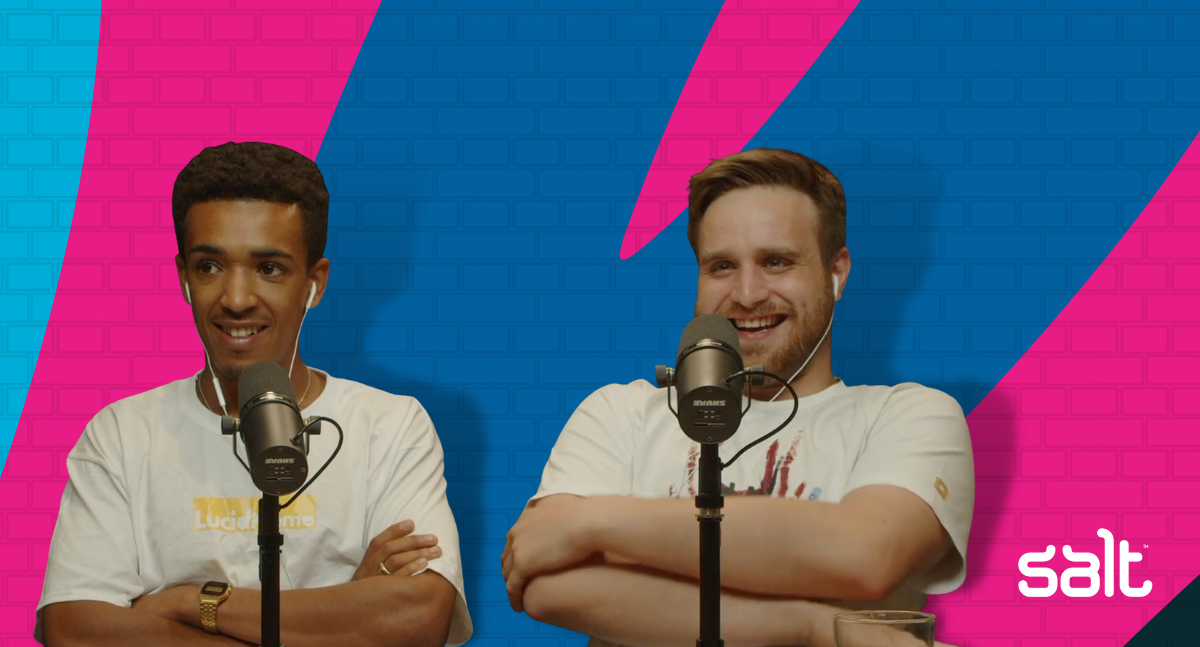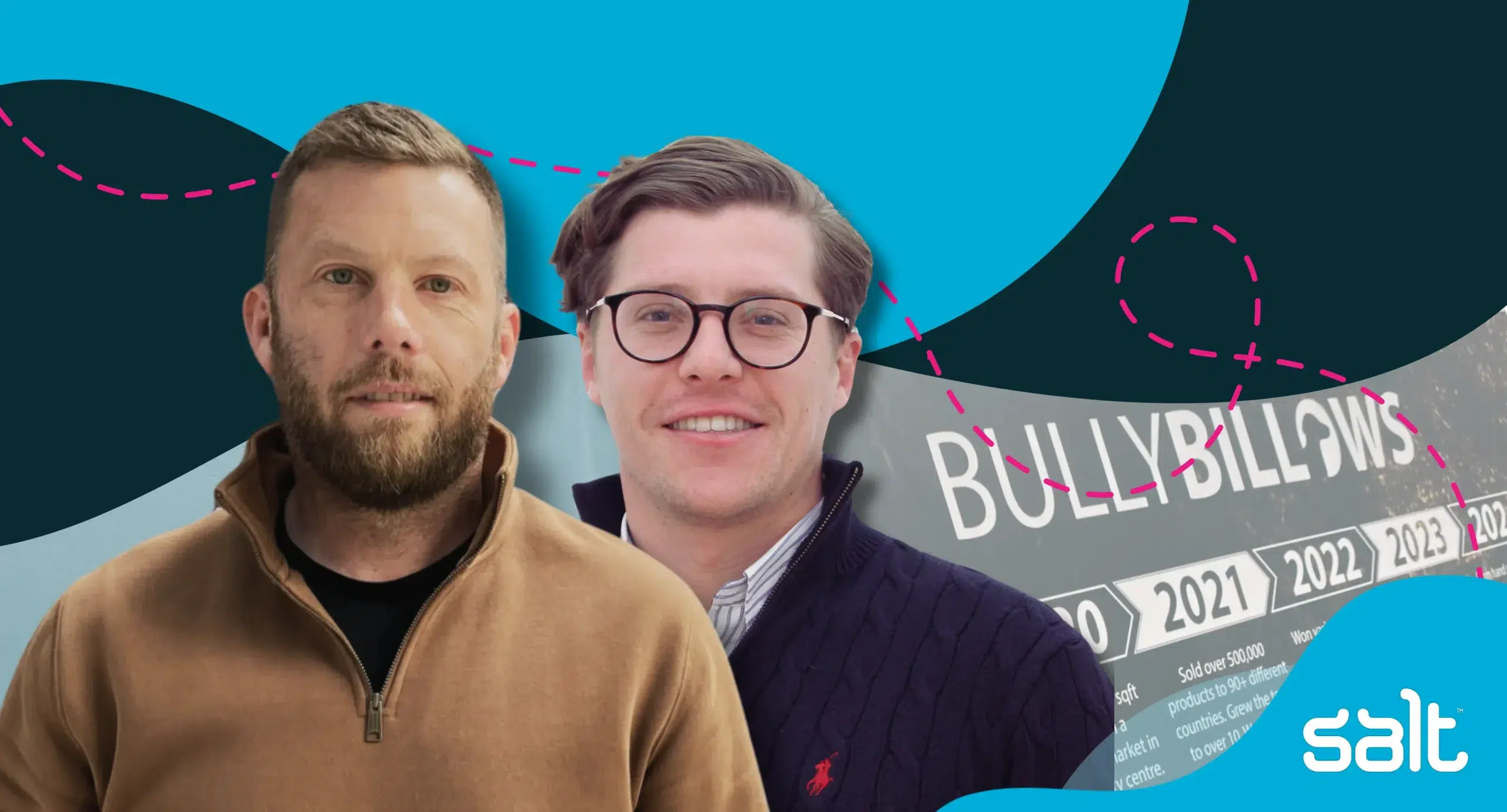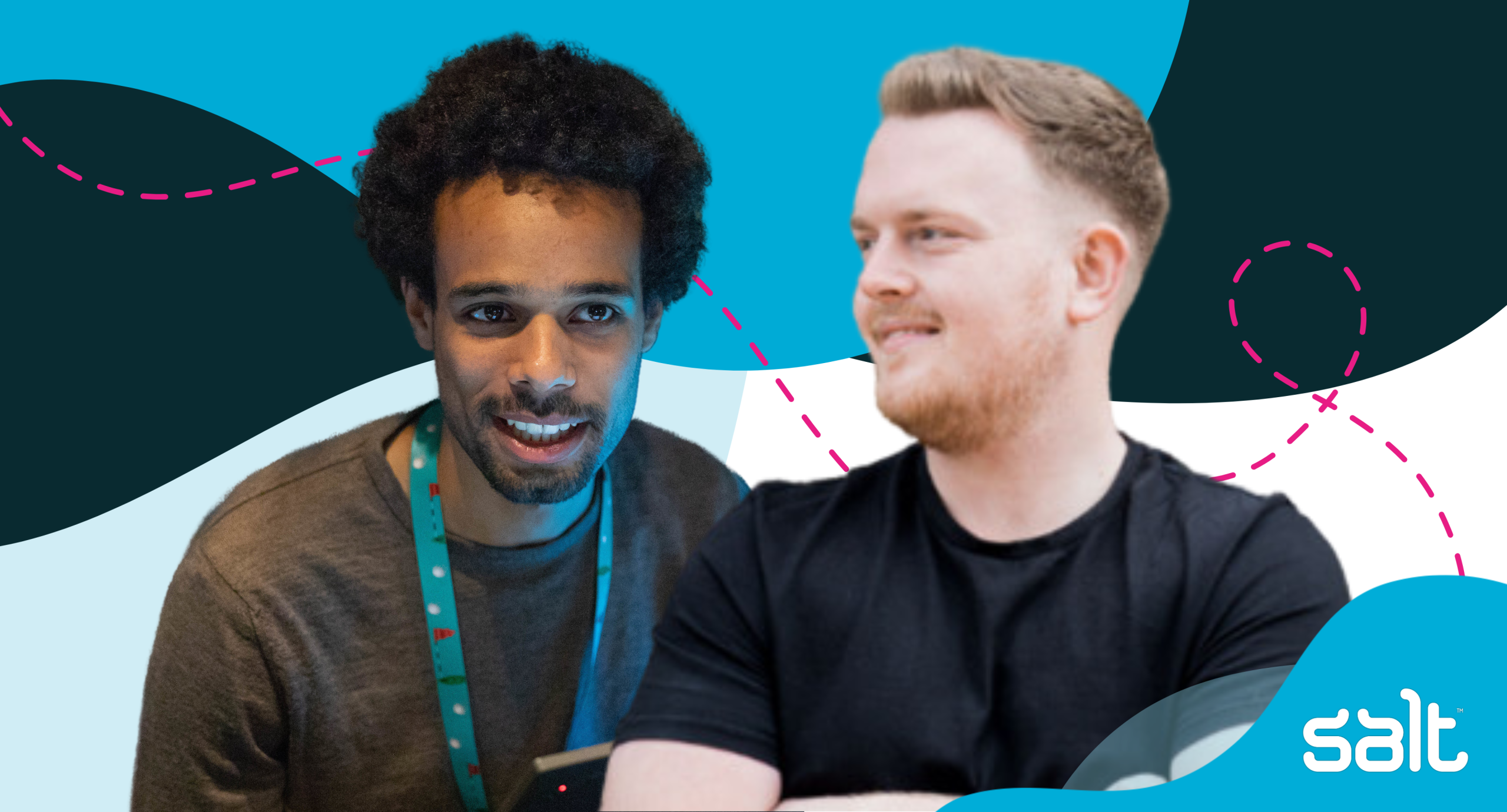
Standing out for the right reasons on social media is hard. You have to meet your audience where they are and make your message relevant to them. Memes break through the noise. The founders of Lucid Meme explain what they are, why they work and how you can revolutionise your marketing strategy on social media.
Watch or listen to our interview:
Or scroll down to read some key highlights!
Introducing Jacob
My name’s Jacob Nomafo. I’m the CEO and co-founder of Lucid Meme. I ran a campaign last summer and very quickly realized the memes were flying off the shelves, completely blurring the other content out of the water, which obviously I like to see.
I solidified the idea for a meme marketing company. Um, obviously before packing my bags in December and moving up to Barcelona. Then in February/March. Jonah came on board, and we formulated Lucid Meme! It’s been a whirlwind couple of months, and we have some exciting updates to share since.
Introducing Jonah
My name’s Jonah Blackburn. I’m the COO and co-founder of Lucid Meme. As Jacob said, he had this amazing data package and he realized there was this massive gap in the market that nobody was seeming to fill.
He came to me with this data packet that showed just how highly converting and highly engaging this type of content was. As a marketer myself, having been in marketing for most of my career, I’d never seen pieces of content perform like I’d seen this perform. I immediately knew that I was on board.
What is a meme and why should marketers care about this?
Jonah:
For me, a meme goes back to my childhood, it goes back to a time when you were scrolling on this new social media that is still kind of evolving in such a rapid way.
I’m almost going back to roots. This is where I first understood this resonates with me – this content can be 8 or 10 words long and will leave me in hysterics. I will have it in my mind for days and days and days and be talking to my friends about it.
A meme is a picture with a section of comedic text. When formed together, it merges an image and a text to create a contextual kind of understanding of a situation.
It’s cultural and it’s generational. For each different subset of society, they get something so different out of memes.
Jacob:
In its purest form, a meme is text paired with a culturally relevant image. It’s the symbiosis of the two which is where the magic happens.
And as Jonah mentioned, these images are so deeply rooted in our childhoods. The power is in the image mainly I’d say, and that’s how it draws upon those old memories and things you associate with it, and that’s what we capitalize on to bring those feelings into content for firms.
Are memes successful for marketing because they evoke emotions?
Jonah:
For sure. So, I would say a lot of our business is actually about the psychology of people. It’s understanding does this piece of content resonate with them. What about this content is standing out? Why is this content performing so much better than this text or this image post. There has to be a reason, right?
So, when you look into it, you actually start to understand that when somebody reads something it can resonate with them on a subconscious level. It doesn’t matter whether they want to or not. They will have that stuck in their head. That will stay for the day, and they will be talking about it. Because you’ve seen something that you agree with on a fundamental level.
These memes create this fundamental emotion. Once you have that kind of initial feeling, there’s no going back from it. That’s why stuff goes viral.
Jacob:
In the wider arena of the internet at the minute, the currency is attention. It’s been that way for a while.
Memory is ascribed by feeling. The things we remember, the things we feel, whether it’s a sad thing happy thing, we remember.
Luckily, we’re in in the business of memes. So, it’s all happy, positive, smiley… They’re so effective because people feel something when they see it and they feel good. And they remember that feeling, whether that’s from a company or a friend posting, they ascribe those positive feelings to the person posting and that’s extremely powerful.
It all comes back to psychology, and how humans work and think. It’s about bringing that way of thinking to social media: putting people’s feelings and emotions at the forefront and then working backwards from there as to how you can get in front of that, get in front of them and make them feel the way you want them to feel.
Jonah:
We are in a very niche bit of the marketing industry that is, and it’s promoting a positive emotion. Whereas on social nowadays, I think there’s too many people who are trying to get likes and follows by this controversial stuff that is actually pretty grey and pretty damaging.
There are way too many kind of agencies out there that don’t really care what content they’re putting out. Just as long as it’s engaging, we actually are doing something to brighten up people’s day.
Jacob:
That’s kind of partly why we’re sitting here today is. Lucid Meme is a bit of a mad concept, and it’s quite hard to kind of explain to people that you want to make memes for a living.
It’s kind of so outrageous that it makes sense.
What does the social bubble look like for different generations – and how do you reach them?
Jacob:
I’d say nowadays, in one sense, there are lots of overlaps between these bubbles. Before it was very segmented, and now it’s starting merge a lot more, as we move from being part of groups to following big pages like channel 4, I saw they were posting memes of the day!
I’d say that’s just because of an overall kind of acceptance of this content as opposed to it being just how us young people communicate or communicated It’s just seeping its way into the wider world of how we communicate in the same way, the internet seeping into kind of every way of how we do everything.
It is the language of the internet. So naturally, it’s becoming the language of the world.
Jonah:
I would almost say there isn’t really as much of a generational gap anymore in terms of social media. For example, companies like, like Ryan Air, they have many different demographics following them, it’s not just a gen z, and everyone is finding it funny.
My mother my grandmother, they’re still sending me memes… And this is quite a crazy concept for me. You know, when I was a kid, I was explaining to them what it was, right? And as it’s evolved and as memes have grown and it’s really become a part of culture. The content is also being made in a broader way.
It’s targeting a message that us as humans have and I think is also why it’s so relatable because this piece of content is triggering everyone.
It’s talking about a topic and is so on point and so relevant for everyone. It really is a full like inclusive package.
What’s your biggest advice to digital marketers to see results on social media?
Jonah:
I want to start with the big news, and I think this is my single piece of advice. So basically, we have just had investment from Gary Vaynerchuk, he’s like a social media God.
Now our whole message is now going to be, simply said, if it’s good enough for him, it should be good enough for you. It is that social validation, we as humans need.
Nobody wants to try something new. Everyone’s so scared to be the first person to go to space.
I think that now that it’s not just clients that we can say we have and case studies we can produce, but it’s actually a backing partner who has done it to a grand scale that lots of people would dream of and has seen the idea, has validated it, said this works, I understand it, and he actually posted a couple of memes on his socials in order to test our idea. The performed way better than a lot of his other posts and they really did well.
Our tagline is the proof is in the pudding.
It’s something that we believe wholeheartedly. It’s something that is a part of us. I don’t just want to be telling you, I want to be showing you. I want to say to you here are the results and I can explain to you why they’re like this.
I think that’s why these companies like Ryan Air are doing so well. Because these social media managers aren’t scared to do something a little outside the box.
My advice to try and convince your boss would be to just try and get them to see that the marketing space is changing. If you’re not keeping up, then you’re left behind.
Jacob:
A hundred percent. It comes back down to how people think, and this is a new thing, especially for these older decision makers. You need to make it relevant to them and kind of present it in a way that makes sense to them.
You need to bring it into their world.
For example, with the Gary Vaynerchuk pitch, we had to bring it into his world. He’s obviously a big opinion leader. So relative to most of the population, he understands what we’re doing.
Instead of a normal pitch deck, where we say this is us, this is what we do, we made a meme on each page about Gary, and basically went through each slide and held a straight face as we watched his reaction of this meme, we made about him. We made it relevant to him, we brought it into his world, so he understands it.
For people looking to captivate their company’s social teams to do the same, think about what resonates with your boss. What do they like? What TV show did they talk about the other day? Put a meme in front of them, see what their reaction’s like, and then they understand the power of it and so they feel the power of it. Then they can get an understanding of what that feels like for their clients. The picture’s much clearer to them as opposed to, let’s post this funny image with, with 8 words on it.
For clients worried about the risk of posting something they don’t understand – what do you advise them?
Jonah:
I would start by saying, we can target key messaging off a very corporate message. Our whole skill set is we’re able to merge a business message with this humour and still keep a professional. That’s our whole hypothesis of what we’re trying to do.
We understand that firms can’t completely take the mic. There is a line of business standard and t we walk that line up until its very last point. And in our experience and our opinions, those are the types of content that really pop.
You shouldn’t post something if you feel a hundred percent safe about posting it. It’s about less words conveying a stronger message.
Jacob:
I’d say now especially people are really risk averse naturally the times we’re living.
I had a chat with an investment bank the end of last year about memes and what they potentially do with memes. It’s a highly regulated industry with so many rules and so many people to get it approved.
Naturally it’s going be heavily, heavily regulated, that makes sense, but it also provides an opportunity for you to stand above the rest. It means that everyone else is being very vanilla and grey. You can really stand out. A good example is Monzo and what Richard Cook is doing for them on social.
Jonah:
While all these CMOs are stuck in their ways and are being so risk averse, you can have a corporate strategy that is going to be really plain, really vanilla. These strategies have a low yield, and will go up and down, up and down, in small increments.
I personally don’t believe that’s the way to build a strategy. It’s not the way the world has evolved. It’s about quick, interactive virality.
Jacob:
The world has changed in that respect. Before it was about how uniform can you be. That’s what it’s been like in social for a while. You post three times a week, you do this, and you get that incremental growth.
Now it’s about who’s doing something different.
We’re talking about Monzo, we’re talking about Ryanair. We’re not talking about HSBC.
Jonah:
It’s the companies that aren’t scared to be above the rest. It’s the companies that aren’t scared to make their own path. I don’t believe companies should be hiding behind their, their CMO’s chair. I think they should be making these bold decisions, going into these board meetings saying, “Hey we need to do something, our growth is at 2%. It can be a lot higher and there’s a reason that it isn’t.”
There hasn’t been an agency doing this before us because no one understands this market. No one understands how to do it.
There are individual people within these big corporations like Ryan Air, like Monzo. There are skilled people that know how to do this. But it’s still not an industry that Marketing understands.
That’s why we truly believe that we are a disruptor of the marketing industry.
We’re the first kind of marketing agency in the UK that does memes and that focuses on this. I don’t even want to call it a niche because I truly don’t believe it is a niche. It was, but now I think it’s genuinely the way of communication.
What is the process then when you start working with one of your clients on a social media marketing strategy like this?
Jonah:
I think it’s super interesting because I think it’s such a new strategy, with a new set of processes that we’ve set up for ourselves.
What’s most important for us is first, we understand the client.
First, we have to understand what it is exactly you want. What are your KPIs? What does success look like to you? What kind of messaging do you want? What are your key demographics? We have to understand exactly the beast that we’re dealing with before we have any sort of approach, and this is done by a series of about 10 to 15 questions that will give us a full picture of their current marketing state.
From there, you can either choose to sign up for a bespoke project, where you come to us with a certain need and we will say, it’s going to be x amount of memes for x amount of money, and this will span over a set period of time.
Companies are allowed 2 of these bespoke projects because we understand people want to try before they buy. After that, we have a retainer based system where we have three different subscription models that will entail different packages on different levels of service on a month on month going basis.
Jacob:
With regards to creative, that’s probably where most of the differences happen between the companies.
Working out exactly who the audience are and what they do on social, what they do in life, and how that relates to the company and then working backwards from there.
We’ve spoken to clients in the past and they’ve said, “We’re a b2b, we don’t need to get in front of people.” Our response to that is companies are people. They’re sitting on their computers, working for a company, they’re on LinkedIn. They’ll see the post.
We dive into what the people that we’re trying to attract look like and then really listen to the client to build into either their wider marketing message or a specific standalone campaign.
We underpin everything with agility. Social so fast moving that we’ve got to be reactive the way that we work. So, that’s something that’s baked into our process as well.
What’s the biggest takeaway so far for you at Lucid Meme?
Jonah:
For me, it’s that understanding more at the beginning really allows you to build that strategy out. Having that big picture view, as someone who comes from a company, who sees a company from very much outside in…
It can be tough sometimes when you’re in these companies and you’re looking from the inside out, you don’t really see the big picture. You just see this campaign, and you see the next campaign, but you don’t see what you’re trying to achieve as an end goal.
An agency like ours, you need to get really inside the headspace of the client.
We would rather spend a lot of time on due diligence really getting to terms with the nitty gritty, than trying to rush in and just put together a strategy. 100%. And that also, lots of people aren’t ready for it.
Jacob:
Lots of people aren’t ready for it. They just don’t get it. They didn’t grow up with memes. They don’t understand the cultural significance. Maybe they’re not even seeing that many of them on their timeline yet, for algorithmic reasons.
That’s why we’re so happy about Gary’s investment, because it’s the social proof that lots of people need to get involved and to jump on the meme wave, which is very much here to stay and getting bigger and bigger by the day.
We found that we need innovators receptive to what we’re doing because it’s an innovative way of marketing.
Jonah:
My real statement to anybody who’s listening to this is go and ask your kids what a meme is. It’s literally what I would say, go and ask your kids, and I promise they will talk for about 6 hours about memes, and why they’re so important, and why they love them so much, and why they can remember the meme that three months ago they saw and found funny.
I’ve got too much data to prove it, and that’s why we love this business.
I can show you in real life, I can show you in data, there’s millions of different ways I can show you the same thing, and it will come to the same conclusion that: people love memes and that’s not going anywhere.
What’s next for Lucid Meme and how can people follow your latest?
Jonah:
What’s next honestly is we’re just going to carry on building. We saw this vision in March, and nothing’s changed in terms of our head. We just now have the social proof that we can go to people and cure their reservations a lot easier.
It’s kind of a chicken and egg situation as people want client testimonials, but you can’t get client testimonials until you have clients. People just need to bite the bullet and actually see what is going on.
Jacob:
We’ve got big visions for where we want this company to go and it’s not just about the world of work. We’re mostly familiar with the kind of UK work culture but we’ve obviously worked and lived abroad as well.
We want people to wait to feel happy on a Sunday evening about their Monday mornings We want to change young people’s approach the workplace and the decision makers approach to young people.
As a company we want to really look after our employees as well. We have lived experience of the ways that we can make our days better as young people in the working world and that’s something that we’re going to bring to more people and hopefully push out to the wider world. Just to make people feel happier sitting at their desks.
Jonah:
I’ve always been a strong believer in this, is you never work a day in your life if you actually enjoy what you do.
I work in a meme industry and I love memes more than anything,
We want to bring that positivity and enthusiasm back into the industry.
Jacob:
The magical thing is that can all start with one laugh one smile from one meme.
Which businesses should we follow for examples on how to use memes well on social media?
Jonah:
Well, first and foremost, follow Lucid Meme on every single platform that you have. As a side note, me and Jacob are both completely contactable at any time, on socials or on email.
For other pages to look out for, I don’t think there’s a set number and that’s why I think this industry is so unique.
There are still social media managers who are going into new positions who have visibility right? It’s not just company to look out for, it’s people within it.
It’s not one company. This can happen with anybody. Once you have the right approach and I think it’s just about educating people about how to have that that right
Jacob:
Companies like Ryanair, Monzo, and Gymshark, they’re all like the tip of the iceberg.
Most of the memes aren’t company pages, they’re super niche Those are the ones that come but then they explode, right? It’s this page that wasn’t created for that purpose that because it’s just so relatable and it’s so organic, it goes insane.
Companies are just at the tip of the iceberg and the undercarriage of that is a whole world of meme content. It’s a wild world out there and it’s going to become more of our day to day.
Jonah:
It’s a wild world and we’re just living in it.
Follow Jacob and Jonah and Lucid Meme to keep up with their latest news!
Keep up with all the latest news and contents from Lucid Meme on LinkedIn or Instagram. Find more contact options on their website.
Follow Jacob on LinkedIn. Email Jacob: jacob@lucidmeme.co.uk
Follow Jonah on LinkedIn. Email Jonah: jonah@lucidmeme.co.uk
Ready to take on a new role? Find your dream job with Salt
Work with talent solutions and recruitment experts to create teams and discover opportunities across Creative, Marketing, Sales, Technology and more.
Create futures with Salt, upload your CV or get in touch with our teams!
Check out our open roles!
Take a look at the jobs we have available around the world:
- Australia
- Canada
- Belgium
- Europe
- Hong Kong
- Malaysia
- Middle East North Africa
- Netherlands
- New Zealand
- Singapore
- South Africa
- United Kingdom
- United States
Keep up with Salt’s career advice to help you on your job search! You can stay in the loop by following us on LinkedIn, YouTube, Facebook, Instagram, Twitter and Spotify.


